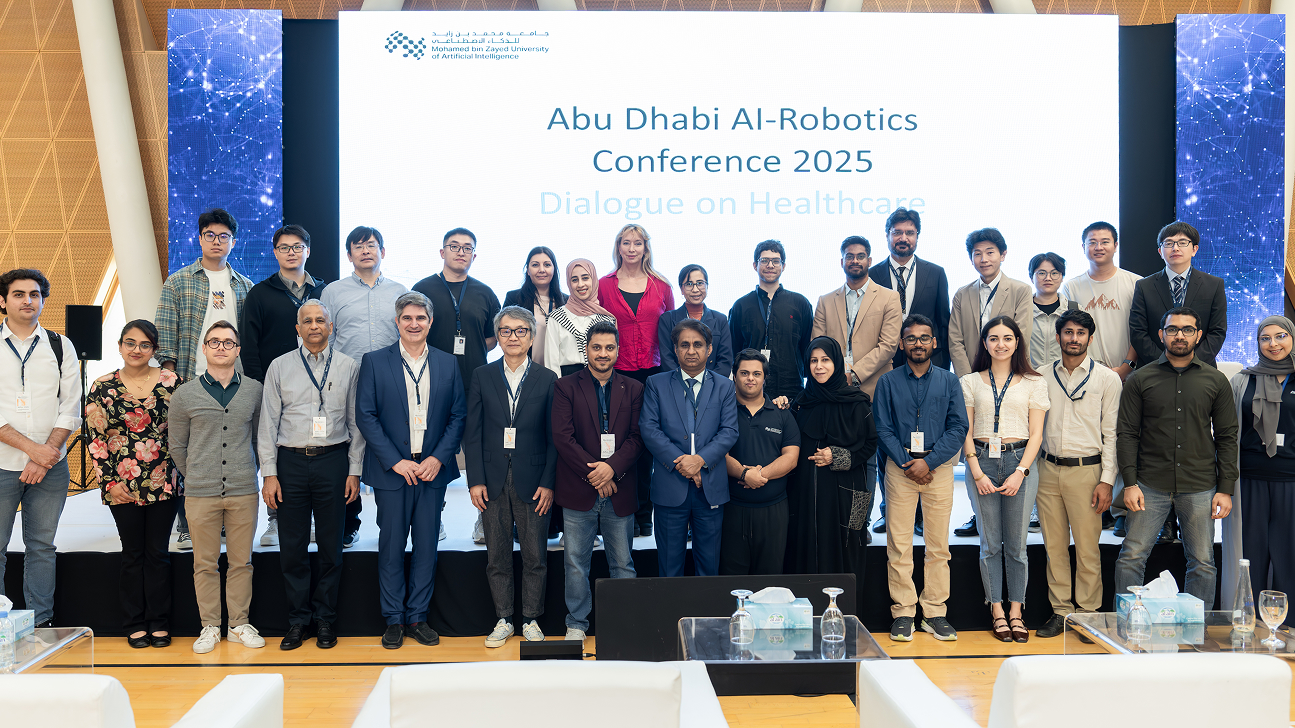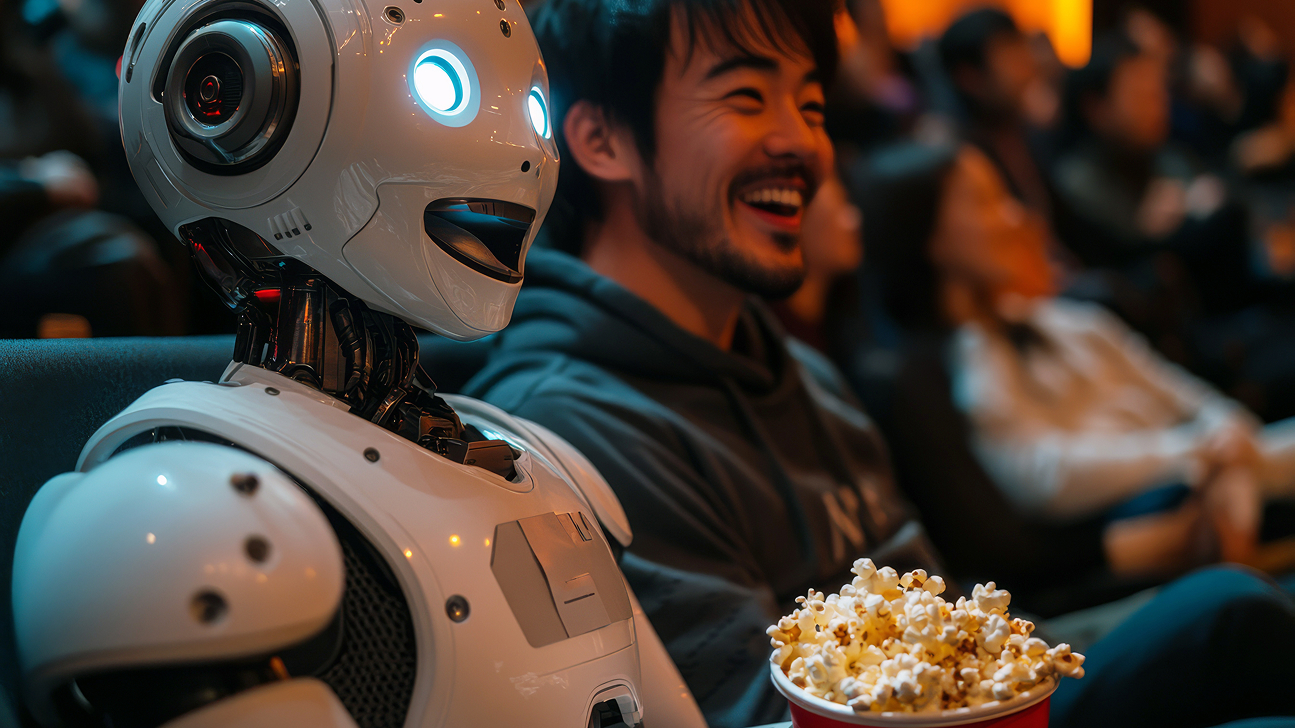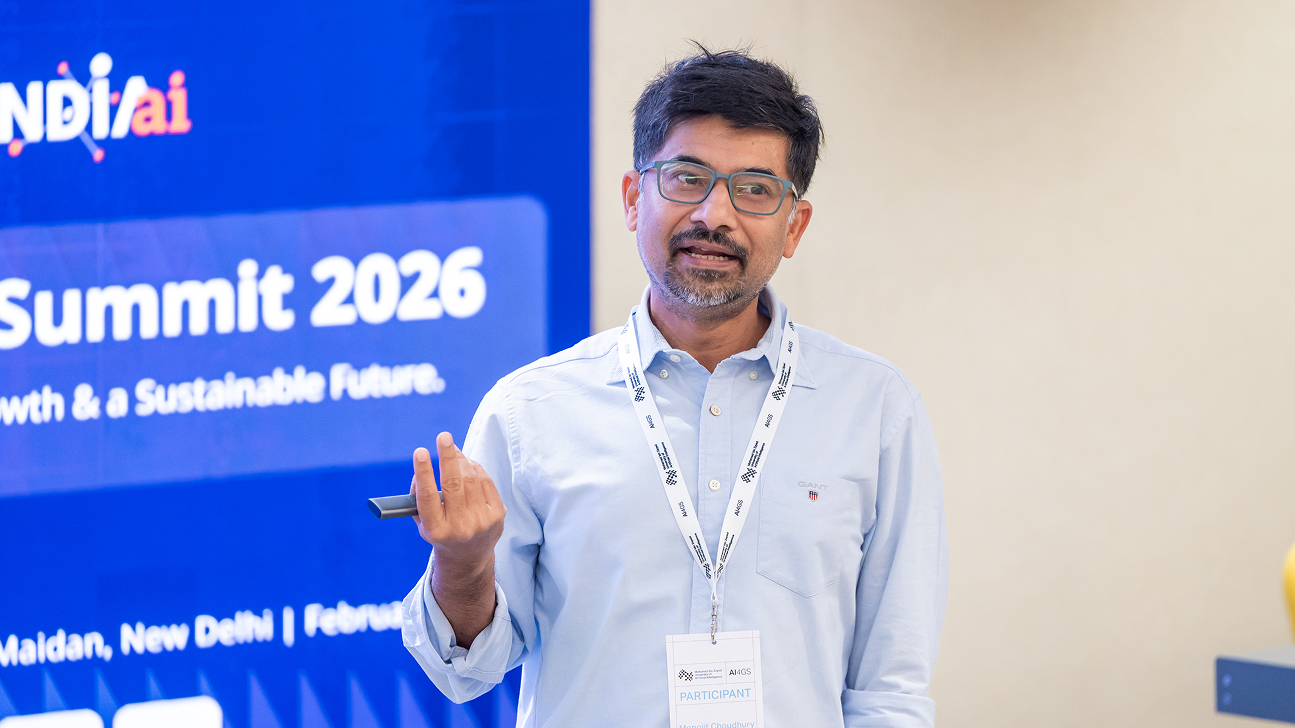Transforming Healthcare with AI-Powered Robotics
Tuesday, April 29, 2025

The future of healthcare was the focal point of the inaugural Abu Dhabi AI-Robotics Conference, which took place at MBZUAI’s Masdar City campus between 23-25 April.
Hosted by Chair of the University’s Robotics Department, Yoshihiko Nakamura, the three-day conference featured leading experts from around the world who explored the potential for AI-powered robotics to transform healthcare in areas such as microsurgery, biorobotics, personalized treatment, and more.
“This conference aimed to foster deep conversations, inspire innovative ideas, and create important collaborations,” explained Professor Nakamura. “By bringing together pioneers in AI and robotics, we hope to chart a course for the future of healthcare technology and make a truly positive impact for people around the world.”
The new annual conference aims to home in on key topics within robotics, with healthcare as the first theme. A diverse array of experts from around the world joined together at MBZUAI to discuss their pioneering work.
Keynote speeches were delivered by guest of honor H.E. Abdulla Abdulalee AlHumaidan, Secretary-General of the Zayed Higher Organization for People of Determination, UAE (ZHO); MBZUAI’s Provost and Professor of Natural Language Processing, Timothy Baldwin; and Vice President of Research and Professor of Robotics, Sami Haddadin.
Spotlight on emerging topics
The conference saw speakers from the USA, Japan, Germany, Italy, the UK, India, France, and the UAE discuss a wide variety of robotics-related topics, led by Nakamura who spoke about his work on human digital twins and humanoid robotics: exploring how virtual representations of patients can be used for personalized treatment planning and simulation.
“The human digital twin can be instrumental in understanding individual human bodies and how their movements affect their wellbeing,” he explained. “As well as helping to predict the potential healthcare issues and injuries of individual patients, the digital twin can help with physical rehabilitation, posture correction, gait analysis and sports medicine, among other things – all custom-designed for the patient.”
Giving a broad view of the current trends and future direction of AI in medicine, Dr. Hassa Al Mazrouei, Medical Director of Executive and International Patient Services, and Physician of Obstetrics and Gynaecology at Sheikh Shakhbout Medical City in Abu Dhabi, spoke about the innovations that are revolutionizing healthcare.
Al Mazrouei highlighted the potential for personalised and predictive care driven by data, operational transformation being led by automation, and global health equity that AI can bring. She also pointed to the positive difference that real-time, AI-powered decision-making could make at patients’ bedsides, and the benefits of human-AI collaboration in patient care.
“In a land of vision, what does AI dare to imagine?” she asked, alluding to the UAE’s proactive, forward-thinking attitude to making positive tangible change.
The conference also saw Cesare Stefanini, Director of the BioRobotics Institute at Scuola Superiore Sant’Anna in Italy, explain how AI is unlocking new opportunities for biorobotics in medicine. Stefanini used his research to show how bioinspired robotic systems for medical applications are developing, such as minimally invasive surgery tools and rehabilitation devices.
“My talk focused on AI-assisted robotics as they are applied to healthcare – particularly in the context of precision medicine including surgery, bionic prostheses, and automated diagnostic instruments,” he said.
“Healthcare is increasingly benefiting from AI-powered approaches, enabling early diagnosis and accurate intervention, and contributing to the 5 Ps of medicine: precise, preventive, predictive, personalized, and participatory. The human component – both doctor and patient – is becoming increasingly empowered by AI and robotics technologies.”
Keeping humans at the center
Human-machine interfaces was an important focus for the conference, with speakers on the subject including Olivier Oullier, professor of behavioural and brain sciences at Aix-Marseille University, France, co-founder of Inclusive Brains, and Chairman of Biotech Dental Group’s AI Institute.
Oullier’s talk introduced proprietary multimodal AI systems trained on behavioral and neurophysiological data – such as brainwaves, facial expressions, and heart rate, among other data – and how they can enhance human-robot collaboration.
“The future is no longer about humans operating robots, but about how to best collaborate with them in daily activities, as well as during complex precision tasks,” he said. “For seamless human-robot coordination, machines must have the power not only to monitor, but to understand and to adapt to human behavior and cognition in real time. And, ultimately, to be able to anticipate them. This is where multimodal AI comes in: it enables true mutual learning and adaptation between humans and machines.”
Elsewhere at the conference, Tetsunari Inamura, professor at the Brain Science Research Institute of Tamagawa University in Japan, explored assistive systems that can support mental health through self-efficacy.
“Mental health is one of the most critical issues of our time,” he said. “Although the relationship between mental and physical health is often discussed, AI systems that can provide integrated and personalized coaching across both dimensions are still under development. Therefore, I believe this research provides an essential perspective for the future of healthcare.”
A growing robotics hub
AD-AIRoC highlighted Abu Dhabi’s reputation as an emerging hub for robotics, with MBZUAI at its core.
“In my opinion, MBZUAI is the best place in the world [for AI-Robotics] where top academic research in AI is translated into concrete solutions that have a positive impact on people’s lives,” said Oullier.
“AIRoC brought together the best interdisciplinary minds in AI and robotics – people I have long looked up to and who have inspired my work. It was an exceptional platform for advancing research that aligns with the UAE’s vision for human-centered, AI-driven innovation, and I’m truly honored to have be invited to contribute alongside such globally revered scientists.”
Stefanini also praised the conference, which will continue to explore key topics for AI and robotics in future editions.
“AD-AIRoC is a world-first and timely initiative,” he said. “By bringing together top-tier experts and stakeholders from AI, robotics, and healthcare, it provided a platform for both cutting-edge joint research and thought-provoking dialogue.”
A full list of the conference’s 20 speakers and hosts, along with their wide-ranging topics, can be found at the event website here.
- healthcare ,
- robotics ,
- conference ,
- Intelligent Robots ,
- medicine ,
- robots ,
- AD-AIRoC ,
- AIRoC ,
- campus ,
Related
AI and the silver screen: how cinema has imagined intelligent machines
Movies have given audiences countless visions of how artificial intelligence might affect our lives. Here are some.....
- cinema ,
- art ,
- fiction ,
- science fiction ,
- artificial intelligence ,
- AI ,
MBZUAI Opens Applications for First Ph.D. Cohort in Human-Computer Interaction
Mohamed bin Zayed University of Artificial Intelligence (MBZUAI) has opened applications for its first Ph.D. cohort in.....
Read MoreBalancing the future of AI: MBZUAI hosts AI for the Global South workshop
AI4GS brings together diverse voices from across continents to define the challenges that will guide inclusive AI.....
- representation ,
- equitable ,
- global south ,
- AI4GS ,
- event ,
- workshop ,
- inclusion ,
- accessibility ,
- large language models ,
- llms ,
- languages ,


